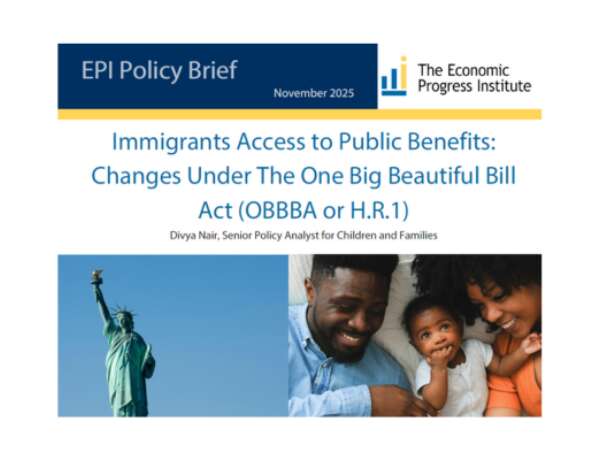One hundred and sixty thousand Rhode Islanders are immigrants. That is nearly one in seven, making up 14.7% of the state’s population. Immigrants have made significant investments in Rhode Island, including their skills, labor, entrepreneurship, and significant tax revenue. In 2023, immigrant households in Rhode Island paid $1.8 billion in federal, state, and local tax contributions. Many arrive seeking safety from war, persecution, and violence, and the United States has long upheld humanitarian protections to help families rebuild their lives and contribute to their communities.
Despite immigrants' contributions, federal welfare policies have restricted their access to public benefits for decades, with lasting consequences for economic and social equity. The “One Big Beautiful Bill Act” (OBBBA), also known as House Resolution 1 (H.R.1), passed on July 4, 2025, cuts nearly $1 trillion in funding for essential public benefit programs like Medicaid and SNAP to finance major tax breaks for corporations and the wealthy. H.R.1 also allocates $170 billion for expanded immigration and border enforcement, including expanded detention capacity, border wall construction, and increased funding for Immigration and Customs Enforcement (ICE).
Meanwhile major administrative and program costs are shifted onto states, particularly those choosing to serve some eligible residents despite immigration status. H.R.1 also further restricts eligibility for many lawfully present immigrants, removing access to critical federal programs and leaving families without the safety nets their tax dollars help support. H.R.1 intentionally targets immigrant communities by both limiting access to vital benefits and by expanding funding for punitive enforcement systems.
H.R.1 marks a deepening erosion of immigrants’ status in the U.S. and reinforces the notion that some people, because of their immigration status, are less entitled to fundamental supports, effectively removing entire groups of immigrants from certain programs and services. These distinctions go beyond access to services and benefits, as they determine who is deemed deserving of care, stability, and dignity. This growing divide undermines the principle of equal protection under the law and weakens the moral and civic fabric that binds communities together.
This policy brief details the federal changes under H.R.1 and their impact on Rhode Island, including which immigrant groups lose eligibility for critical benefits and how these cuts will affect families, communities, and the broader state economy.

